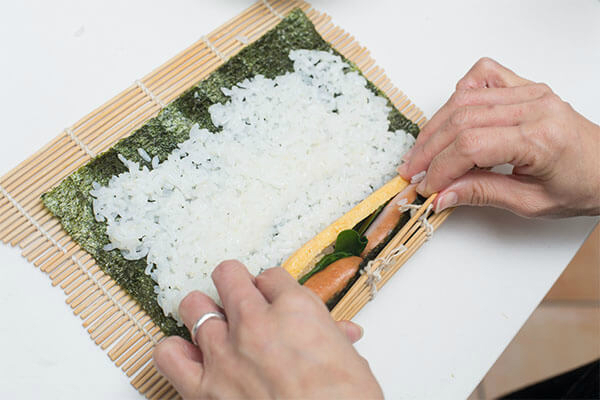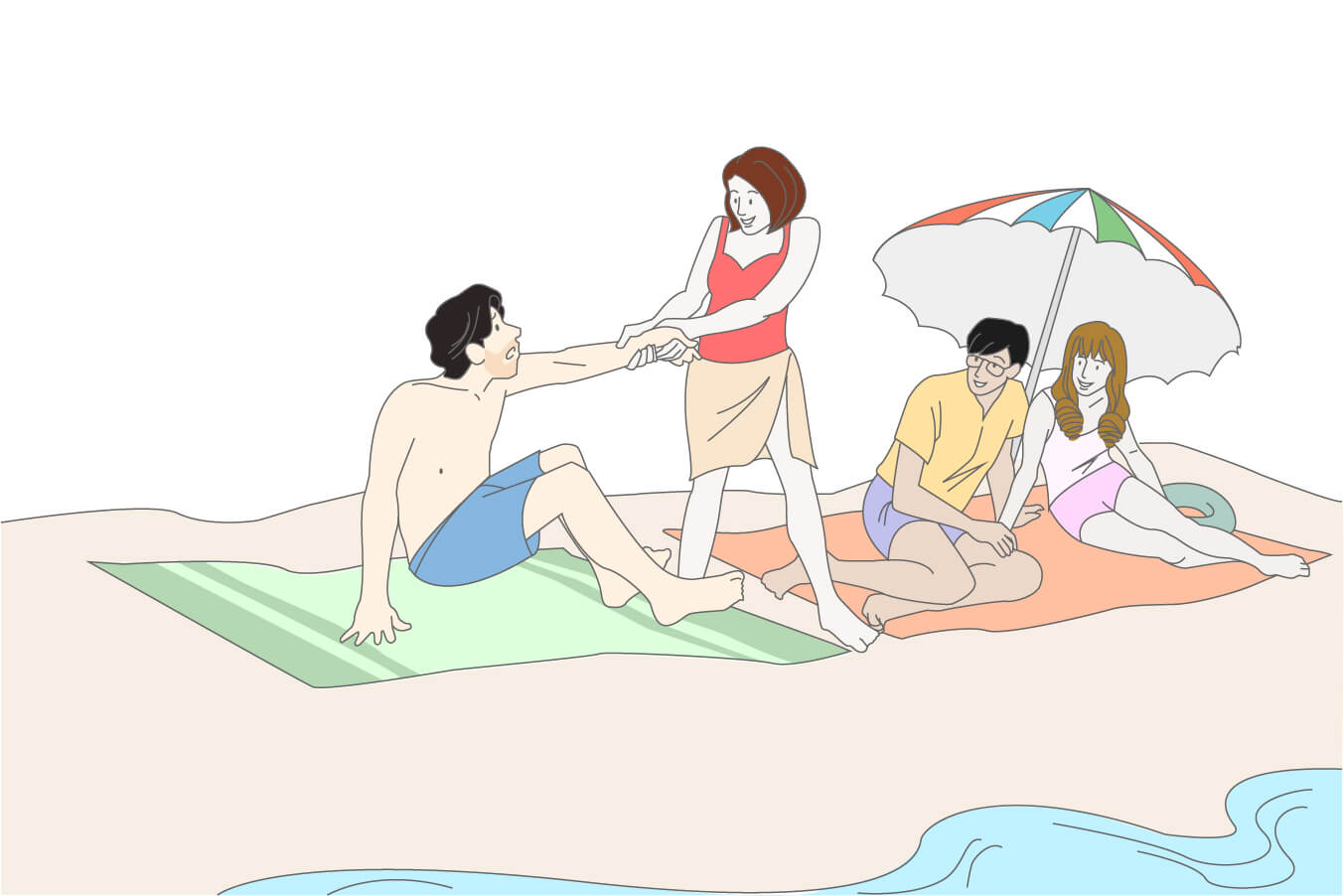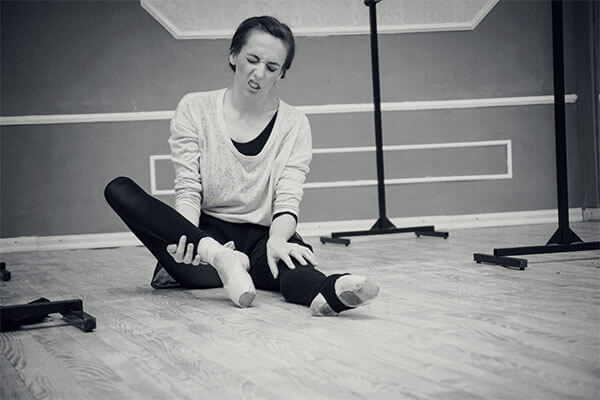INTRODUCE
Talking about your strengths and weaknesses is a good way to connect with others. 自分の得意、不得意なことを話すことは、相手と親密になるのに良い方法です。

PRESENT
STEP A VOCABULARY
I. Listen and repeat.聴いて、リピートしましょう。

be good at [thing][事]が得意だ |

be bad at [thing][事]が不得意だ |

be great at [thing][事]が上手だ |

be horrible at [thing][事]がすごく下手だ |

be in love with [thing][物・事]が大好きだ |

be afraid of [thing][物・事]が怖い |
II. Match the activities below with the phrases above. Choose one phrase for each activity.上記のフレーズのうち、どれが次の行動に合いますか。それぞれ1つずつ選びましょう。

making sushi

juggling

driving
III. Practice reading the words.単語を読む練習をしましょう。
 /gr/ |
 /kr/ |
|---|---|
great 上手な・偉大な |
crate 木箱 |
grab つかむ |
crab カニ |
grow 成長する |
crow カラス |
STEP B GRAMMAR TIP
Use quite, kind of, and not so to modify adjectives.
quite、 kind of、not soを使って形容詞を修飾することができます。-
Use quite to strengthen adjectives.
quiteは形容詞の程度を強くします。 -
- I’m quite hungry!
- 私はすごくおなかが空きました!
- He’s quite good at swimming.
- 彼はとても水泳が得意です。
-
Use kind of to soften adjectives.
kind ofは形容詞の程度を弱くします。 -
- I’m kind of tired today.
- 私は今日やや疲れています。
- She’s kind of afraid of dogs.
- 彼女は少し犬を怖がっています。
-
You can also use not so to soften adjectives. To soften criticism, use not so with positive adjectives.
not soも形容詞の程度を弱くするために使います。批判的な意味を持たせすぎないように、not soは肯定的な形容詞と一緒に使います。
She’s bad at sports. → She’s not so good at sports.
-
- I’m not so good at baking.
- 私はそんなにパン作りが得意ではありません。
- He’s not so nice.
- 彼はそれほどいい人ではありません。
UNDERSTAND
SPEAKING
Haru, Lorenzo, Yuki, and Daiki just arrived at the Blue Pearl Resort on Coron Island.
ハル、ロレンゾ、ユキ、ダイキは、コロン島のブルーパールリゾートに到着しました。
 |
- Haru:
Come on, Lorenzo! Let’s go swimming!
- Lorenzo:
Um, don’t you want to stay on the beach a bit longer? The weather is perfect for sunbathing.
- Haru:
The weather is perfect for swimming, too. Let’s go!
- Lorenzo:
But the waves look big…
- Haru:
Oh, that’s okay. I’m quite good at swimming. I was on the swim team in high school, actually.
- Lorenzo:
That’s cool! I didn’t know that. But, um, you should ask Daiki and Yuki to swim with you. I’ll stay here and take photos.
- Haru:
But it won’t be fun without you! We can take photos later. Let’s go swimming!
- Lorenzo:
I, um… I’m not so good at swimming. Actually, I’m quite bad at it.
- Haru:
Are you serious?
- Lorenzo:
Yeah. I’m kind of afraid of the water… Are you angry?
- Haru:
I’m not angry… To be honest, though, I’m kind of shocked!
TRIVIA
In Japanese, shokku (ショック) is used to say that someone is disappointed. In English, however, shocked just means that someone is very surprised. Shocked can be used in both positive and negative situations.
O I was shocked when my friends gave me a surprise birthday party!
O She was shocked that her boyfriend was afraid of the water!
日本語で「ショック」というのは、失望した時に使う言葉ですが、英語では、とても驚いたという意味にすぎません。ですので、「shocked」は肯定的にも否定的にも、どちらの場面でも使えます。
O 友達が私のためにサプライズ誕生パーティを開いてくれたので驚きました。
O 彼女はボーイフレンドが水を怖がっていることにショックを受けました。

PRACTICE
STEP A EXERCISE
Replace the underlined words with words in the box. More than one answer may be possible.
下線の単語をボックスの単語と置き換えましょう。答えは一つとは限りません。
- I’m really horrible at dancing.
- I’m not very great at speaking in front of lots of people.
- I’m a little afraid of snakes.
- I’m very in love with water sports.

STEP B EXERCISE
Answer the questions using the pictures and words in the box. More than one answer is possible.
写真とボックスの単語を使って、質問に答えましょう。答えは一つとは限りません。
1. Tutor: Are you good at running marathons? |
Student:
|
2. Tutor: Are you afraid of spiders? |
Student:
|
3. Tutor: Are you good at riding a bike? |
Student: |
4. Tutor: Are you in love with gardening? |
Student: |
CHALLENGE
Challenge 1
You are planning a vacation with your friend.
あなたは友達と休暇の計画をしています。
Talk about the activities you’re good at and the activities you’re not good at.
あなたが得意、不得意とするアクティビティについて友達と話しましょう。
Today's grammar tip
- not so
- kind of
- quite
 |
Challenge 2
Discuss your ideas. あなたの意見を言いましょう。
 If Time
If TimeAllows
1 YOUR STRENGTHS |
2 YOUR WEAKNESSES |
3 SEASONAL SKILLS |
|---|---|---|
|
1 YOUR STRENGTHS
|
2YOUR WEAKNESSES
|
3SEASONAL SKILLS
|
FEEDBACK
I can explain how good or bad I am at something and why.何が得意、不得意かを話し、その理由を説明できるようになる。
LESSON GOAL ACHIEVEMENT
-
4
Very GoodCould complete the task with ease
-
3
GoodCould complete the task with some clarifications
-
2
FairCould complete the task with additional instructions
-
1
PoorCould somehow complete the task with difficulty
PERSONALIZED FEEDBACK
-
RANGE
表現の幅
語彙をどの程度使えるか How well can you use vocabulary? -
ACCURACY
正確さ
文法が正しく使えているかどうか Are you using grammar correctly? -
FLUENCY
流暢さ
円滑に喋ることができるかどうか Are you able to speak smoothly?





